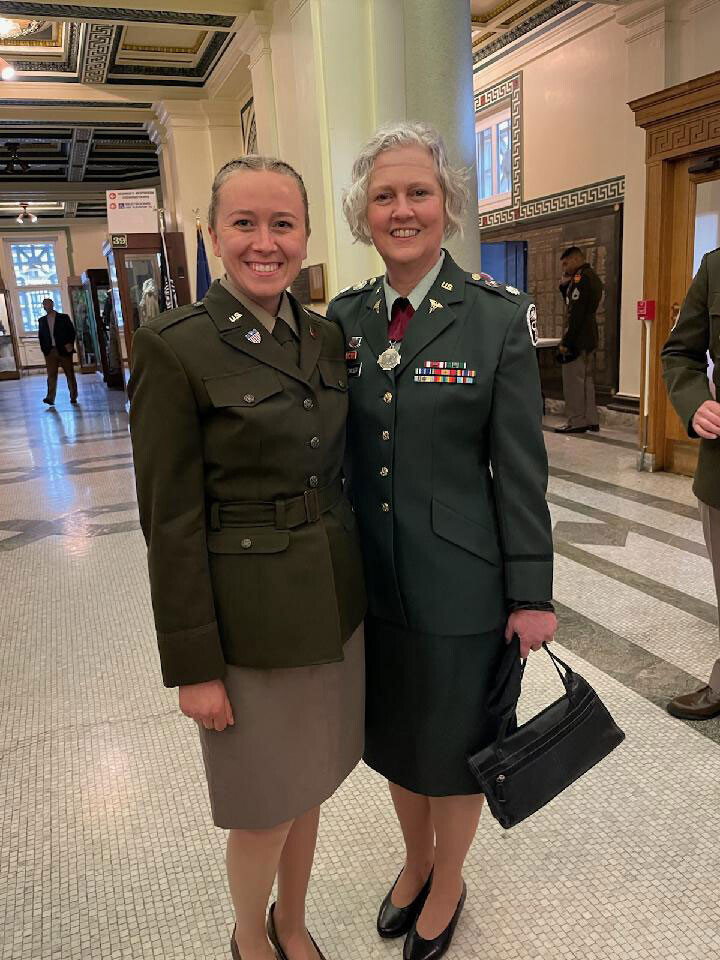Dr. Rebecca “Becky” Kitzmiller, an associate professor at the University of North Carolina School of Nursing, teaches in the master’s and doctoral programs and within the Carolina Health Informatics Program. She claims to be where she is today because when doors opened, she recognized the opportunities and chose to walk through them.
A native of Maryland, her first open door came when she attended the University of Pennsylvania School of Nursing from 1984 to 1988. “My parents were able to save up enough money to pay one year of tuition,” said Dr. Kitzmiller. “After that, I was on my own to figure out how to stay at Penn.”
During her first year, ROTC seniors came to the dorms to invite the first-year students to an activity of rock climbing and rappelling. “I thought it seemed like a fun thing to do,” she said. “That was my first exposure to ROTC and a possible military career.”
Dr. Kitzmiller applied for and received a three-year scholarship to pay for the rest of her undergraduate schooling. As a US Army officer, her first duty assignment sent her to Germany, where she met her now-husband of 31 years, John. “I thought I was brave enough to go somewhere alone, so when a second lieutenant position became available in Germany, a door opened, and I walked through it.”
She explained that the military offers multiple programs to support health care graduate education. She applied for the long-term health education program to pursue health care administration and was accepted to study at Duke University. One of her professors there started an informatics program — a field she describes as “the combination of a health care specialty with computer and information science to effectively facilitate the use of technology in the delivery of care.”

Dr. Kitzmiller enjoys a Hurricanes game with her husband, John (Jay) Kitzmiller. Contributed photo
“I was among the first nurses to go through Duke’s informatics program. Walking through that door changed my career trajectory. I was on a path in the military to become a nurse manager, but because of my informatics degree, while stationed at Fort Bragg from 1997 to 2002, I joined a team to build a replacement hospital. They needed an informatics specialist to lead the implementation of all data-related equipment. I was the first woman and the third informatician in the Army to be involved.”
The new hospital project became her fondest memory of her time on active duty. “If I could do that project again and again, I would,” she smiled. “The elements of very detailed planning and working in collaboration with people building a facility — the engineers, senior project planners, experts in budgets, and contractors — was an amazing experience.”
At the same time, she enjoyed walking side by side with clinicians on their journey to envisioning new and effective ways to provide care to patients through technology use. When transitioning from active duty to the reserves, she worked at Duke University Medical Center for three years as the director of nursing informatics. Dr. Kitzmiller retired from the US Army Reserves as a lieutenant colonel in 2009.

Dr. Kitzmiller is pictured with daughter Katherine during her commissioning as a US Army Second Lieutenant. Contributed photo
According to Dr. Kitzmiller, the pathway to becoming a nurse today still relies heavily on the scientific groundings of patient care. “The basic foundation of nursing will always be there. At any time, equipment can fail, the power goes out, or we have a mass casualty event, and we must take manual equipment to the scene. Those skills must always be the foundation of a competent nurse. The technology we use should enhance nurses’ skills to improve patient care.”
After earning a PhD in nursing from Duke in 2012, Dr. Kitzmiller joined the faculty at the University of North Carolina at Chapel Hill. She currently teaches leadership, change management, quality improvement, and informatics courses in the School of Nursing’s graduate programs. Her research continues to focus on effective use of technology in health care. Most recently, Dr. Kitzmiller collaborated with a research team at the University of Virginia around the implementation of a device that predicts patient decline from respiratory or circulatory failure. Together they identified strategies for helping the interdisciplinary team adapt this forecasting device into their practice. “That work underlies the foundation I use when teaching students how best to approach significant change in the practice environment,” she said.
UNC School of Nursing, one of 10 Pacific American Health Organization and World Health Organization Collaborating Centres for Quality and Safety Education in Nursing and Midwifery, provided Dr. Kitzmiller with another “door,” the opportunity to share training, best practice, and research in informatics and technology use. e goal is to empower nurses worldwide to be leaders and advocates in their care communities.
Dr. Kitzmiller resides in Apex, where her husband owns Apex Dental Group. Her oldest daughter, Katherine, is an Army second lieutenant in Tacoma, Washington. Her youngest daughter, Elia, is a rising junior at the University of South Carolina. She serves on the leadership team for Jordan Lutheran Church and is a youth group leader.
As she nears retirement age, Dr. Kitzmiller is looking for the next door that might allow her to travel and serve others alongside her husband, whether in the health care eld or not. “As we prepare for the next transition, how do we share our skills?” she asked. “We can go anywhere and are ready to lend a hand.”
- Garden Adventurer: Beyond Purple: The Other Beautyberries
- Liquid Assets: Unicycle Pale Ale
- Liquid Assets: Easy Peasy, Lemon Squeezy
- Restaurant Profile: La Victoria Mexican Food
- Small Business Spotlight: Crumb & Cream
- On Trend: Hair Extensions
- Erica Chats: Finally Feeling Fall
- Less is More
- Nonprofit Spotlight: Shield North Carolina
- Women of Western Wake: Tamani Anderson Powell
- Meet Cary Magazine’s 2023 Women of Western Wake
- Women of Western Wake: Dr. Rebecca Kitzmiller
- Women of Western Wake: Patsy Johnson
- Women of Western Wake: Sheri Erhart
- Women of Western Wake: Leslie Covington
- Things to Do: September 2023







Proud of you Dr